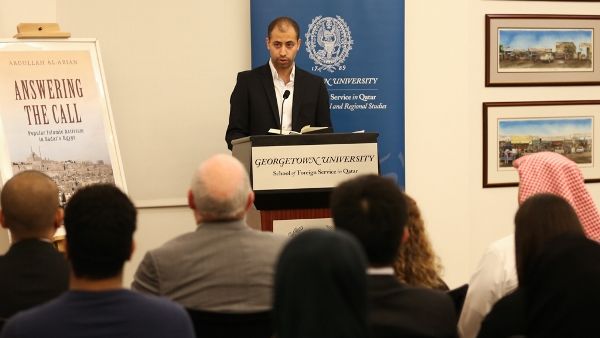Georgetown book reading presents a lesson in Egyptian Islamic activism

Georgetown University in Qatar Professor of History, Dr. Abdullah Al-Arian, presented a reading from his book, "Answering the Call: Popular Islamic Activism in Sadat's Egypt" at a recent event hosted by the Center for International and Regional Studies (CIRS) at the school’s Education City campus, where he reflected on the rise of Islamic activism in Egypt in the previous decades, and discussed the impact of those events on the recent Arab Spring revolution and struggle for political power.
In his book, Al-Arian uses a broad range of sources to present a comprehensive account of Islamic activism in Egypt during the presidency of Anwar al-Sadat. He describes how revolutionary hero Gamal Abdel Nasser dismantled and suppressed Egypt's largest social movement organization during the 1950s, and the surprising re-emergence of Islamic activism of the Muslim Brotherhood who would one day compete for the presidency in the nation's first ever democratic election. Answering the Call is an original study of the history of this dynamic and vibrant period of modern Egyptian history.
Explaining why studying the history of a struggling movement holds interest, he said: “No matter how much we are consumed by events elsewhere, Egypt is not forgotten. Even as the post-coup order has pursued the rise of a new authoritarianism relying on the unprecedented use of violence to eradicate popular activism from Egyptian society...there's still a broad interest in documenting this process and learning the lessons of Egypt's failed revolution in the hopes that this and future generations can use the knowledge of this historical moment in the service of liberating their societies and empowering their people.”
Reading from his book, the Georgetown professor explained that the Muslim Brotherhood's success in rebuilding its organization during the 1970s was the result of its ability to attract a young, educated, intellectual generation of Islamic activists seeking political change. This rejuvenated the struggling organization, and launched a new phase in its history. He explained that among the social and religious movements of the earlier decades, only the MB's hierarchical structure and focus on social services was capable of challenging state power. Thus, when the popular uprising swept across Tahrir Square and other public spaces, “the MB was poised to place its three decades of experience in the service of a national movement to overthrow the regime of Sadat's successor, Hosni Mubarak.”
“The generation of current leaders, like Mohamed Morsi...figures that we've heard so much about in the past three or four years, did not emerge in a vacuum. They're the products of a generation that has its roots in the 1970s student movement. That movement demonstrated tremendous dynamism in the development of its activism, enjoyed a complex relationship with the state, and ultimately came to make up the next generation of leaders of the MB, an organization that had been all but destroyed for 20 years. This book tells that story,” said Al-Arian to the audience.
The director of CIRS, Dr. Mehran Kamrava, commented on the importance of the lecture topic, saying: “This timely book is not only a comprehensive history of the re-emergence of Islamic activism in Egypt, it is also a reminder that the dramatic events we see unfolding today are inexorably linked to the past. And without understanding that past, we can’t fully understand the present, nor project what may happen next. Al-Arian’s work is invaluable, both as a compelling historical narrative, and for its contribution to research on the region.”
Abdullah Al-Arian’s research interests include Islamic social movements, US relations with the Middle East, Islam and globalization, Islamic law and society, and the history of Islam in the United States. He is a frequent contributor to the Al-Jazeera English network and website.
Background Information
Georgetown University in Qatar
Established in 1789 in Washington, DC, Georgetown University is one of the world’s leading academic and research institutions. Georgetown University in Qatar (GU-Q), founded in 2005 in partnership with Qatar Foundation, seeks to build upon the world-class reputation of the university through education, research, and service. Inspired by the university’s mission of promoting intellectual, ethical, and spiritual understanding, GU-Q aims to advance knowledge and provide students and the community with a holistic educational experience that produces global citizens committed to the service of humankind.
Located in Doha’s Education City, GU-Q offers the same internationally recognized Bachelor of Science in Foreign Service degree as Georgetown’s Capitol Campus in Washington, DC. This unique, interdisciplinary program prepares students to tackle the most important and pressing global issues by helping them develop critical thinking, analytic, and communication skills within an international context. GU-Q alumni work in leading local and international organizations across industries ranging from finance to energy, education, and media. The Qatar campus also serves as a residency and delivery location for the Executive Master’s in Emergency and Disaster Management along with the Executive Master’s in Leadership.







